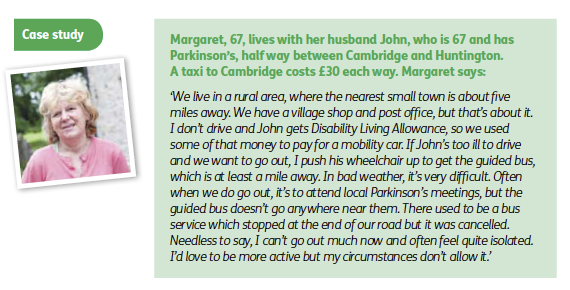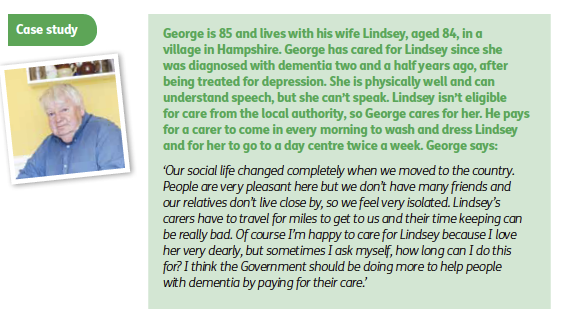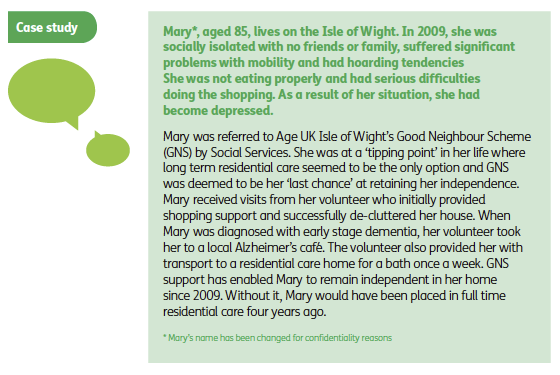 Age UK is the largest national charity organisation dedicated to helping those in later life. With 450 shops around the UK it has branches in nearly every major city and is able to reach out into rural communities to provide assistance to those in need.
Age UK is the largest national charity organisation dedicated to helping those in later life. With 450 shops around the UK it has branches in nearly every major city and is able to reach out into rural communities to provide assistance to those in need.
Age UK are another organisation that have been instrumental in both raising awareness of the problems faced by the elderly in rural communities and in tackling those problems.
In a recent report they highlighted that fact that due to us living longer and with the baby boomers now reaching pensionable age the problems are set to escalate and that urgent action needs to be taken in order provide for the needs of Britain’s growing old age population.
In their report they examine many of the issues mentioned previously in the blog and they offer examples of successful schemes that have been introduced by local councils that are working to alleviate the problems.
Transport
They firstly raise the transport issues with funding being cut to bus companies resulting in services being reduced or removed. They raise the importance of the buses and how this simple provision offers such huge freedom and independence for locals that they are critical to their health and wellbeing.

The report goes on to mention the successful Dial a ride schemes that exist in places such as Cornwall and The Isles of Scilly. Not relying purely on government funding the schemes are supported through local business and community donations and volunteers. A survey has shown a 96% satisfaction level with the service with 88% on responders saying it has a positive effect on their lives.
Health and Social Care
Although those living in rural areas generally enjoy the benefits of a healthier lifestyle it does not negate the problems of failing health in our later years. There are multitudes of problems faced as we get older from an increased susceptibility to general illness to more serious conditions like Cancer and Parkinson disease. Treatments can often mean many trips to medical outlets and hospitals and most of these are based many miles away in the cities. Home care has also become increasingly costly as charges for extended travelling being placed on those that need it and this is coupled with inflexibility of appointment times and a shortening of the time a carer can spend with a client.

Age UK has already welcomed sweeping reforms introduced by the coalition government but warn that in order for the changes to work then a wealth of operational errors need to be removed from the NHS working practices. With huge amounts of unnecessary hospital appointments being prevented by better targeted responsive personalised schemes it will see billions wasted on health care each year being made available to those that need it.
Fuel Poverty
Rising prices in fuels is putting extra pressure on everyone but the issues are acutely felt by those in rural areas. The housing is often old and lacks much of the modern insulation systems that make them energy-efficient. In addition the age and structure of these houses make modernising them difficult and expensive to achieve. In 2011/12 there were 21,700 deaths of people aged over 65 that was directly attributed to excess winter death. In addition many of the rural homes are not connected to the national gas grid and as such rely on alternative fuels such as heating oil, LPG or solid fuels which are often a lot more expensive. With both populations and costs increasing the number of deaths is set to rise.

The Energy Bill Revolution is a public campaign supported by age UK to persuade the government to use the carbon taxes to invest in making people’s homes far more energy-efficient. In addition to it helping to prevent unnecessary deaths it also reduces damaging emissions, lowers energy bills and creates employment. Age UK is also calling on local authorities to revise their Health and Well Being strategies to have a greater focus on fuel poverty as a 2013 survey found that only 4% of schemes are doing as much as possible to prevent fuel poverty in their local communities.
Broadband Coverage
Rural areas on average have much slower connection speeds than their urban counterparts. This technology is vital in rural areas and provide many benefits for living in small hamlets and villages. Telehealth is a system which relies on technology to monitor the health of its clients. Through a system of constant feedback it allows carers to know instantly if there is a change in a person’s health and allowing them to respond accordingly. Without such technology it would require multiple visits by either the client to a hospital or a carer to the client. Healthcare is not the only area that can benefit with broadband often providing the spark for innovative community schemes that promote social inclusion and can have a positive effect on local economic growth. It also allows people to keep in touch with family members through email and video calling which can have a very positive effect on loneliness and isolation.
Age UK is calling for all internet providers to take a look at their infrastructure and how they provide services to rural areas. Currently costs are increasing with providers citing longer distances to the exchanges and ageing cables that require replacing. In addition to this the elderly often require more help in setting up and getting to grips with understanding and using the technology. Age UK is pressing the government to meet its own ambitions of providing 24mbs or higher coverage to 90% of the population and at least 2mbs to the final 10% by 2015. It is also pushing the government to provide further funding into providing training for elderly people who have never used the technology before.
Loneliness and Isolation
Loneliness and Isolation are two distinctly separate things yet are often closely related. Rural living can often lead to people feeling isolated and is often preceded by a death of a partner. But isolation can occur even with people living together as they struggle to find common ground to interact with and results in them being left feeling excluded. In addition, sometimes people prefer remote solitude and are happiest this way so would not necessarily fall victim to loneliness. Loneliness tends to be the result of a lack of social interaction at is often the persons personal feelings resulting from that. Although isolation can often lead to loneliness it is not always the case and loneliness can occur in groups if the person does not feel socially included.
Loneliness if left unaddressed can lead to acute depression and suicide and with statistics showing and growing increase in elderly people taking their own lives and is something that needs a lot more research and focus.

There has been very little research in the UK into how to prevent loneliness but in America and across Europe where many more studies have been conducted the overall trend is towards increasing elderly individuals access to social networks. In addition Age UK is supporting schemes which encourage the elderly to use their life skills to get involved in community projects. From organising events such as exercise classes to more ambitions projects of running and distributing local magazines. These schemes which are supported through a variety of funding methods give older people a new focus and allows them to positively contribute to their local community and interact with others at the same time.
